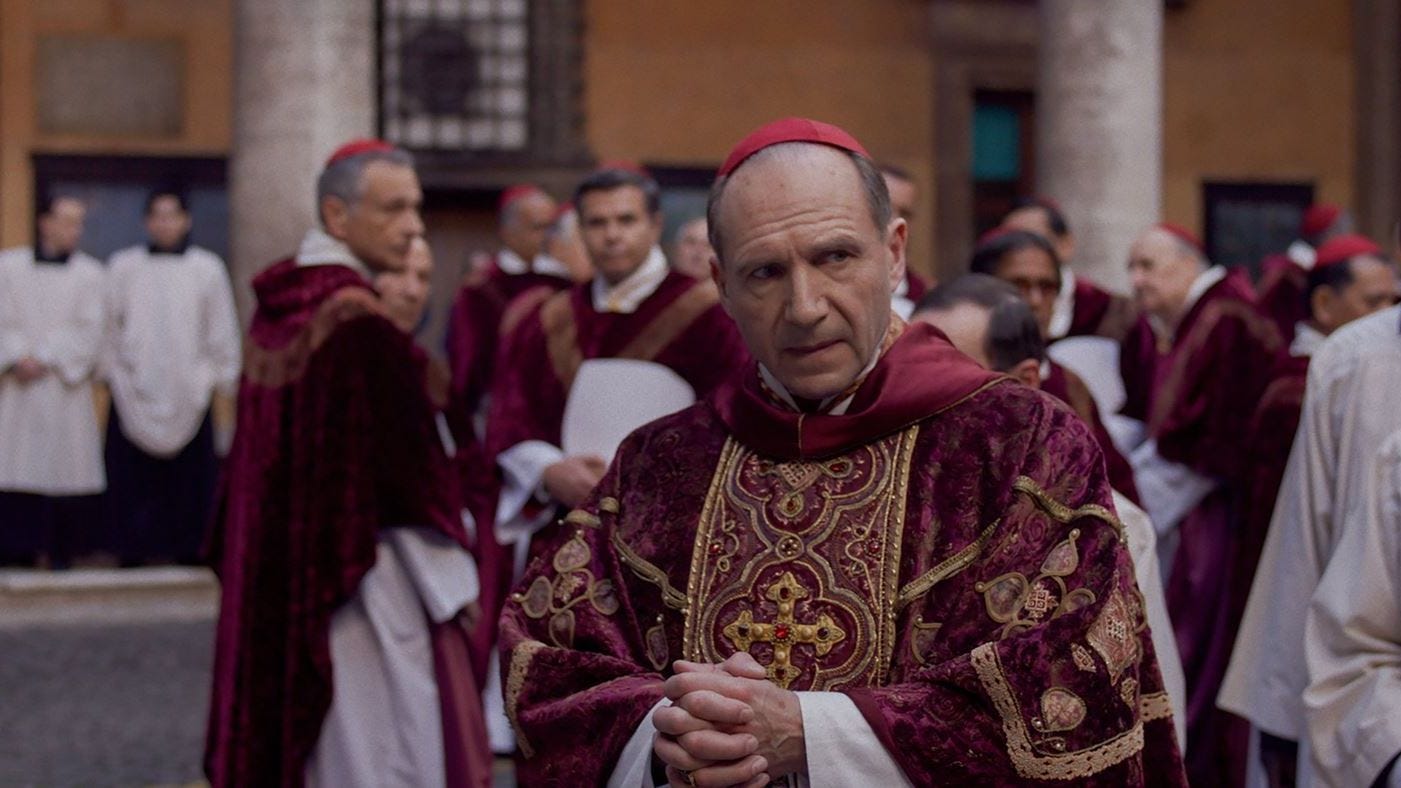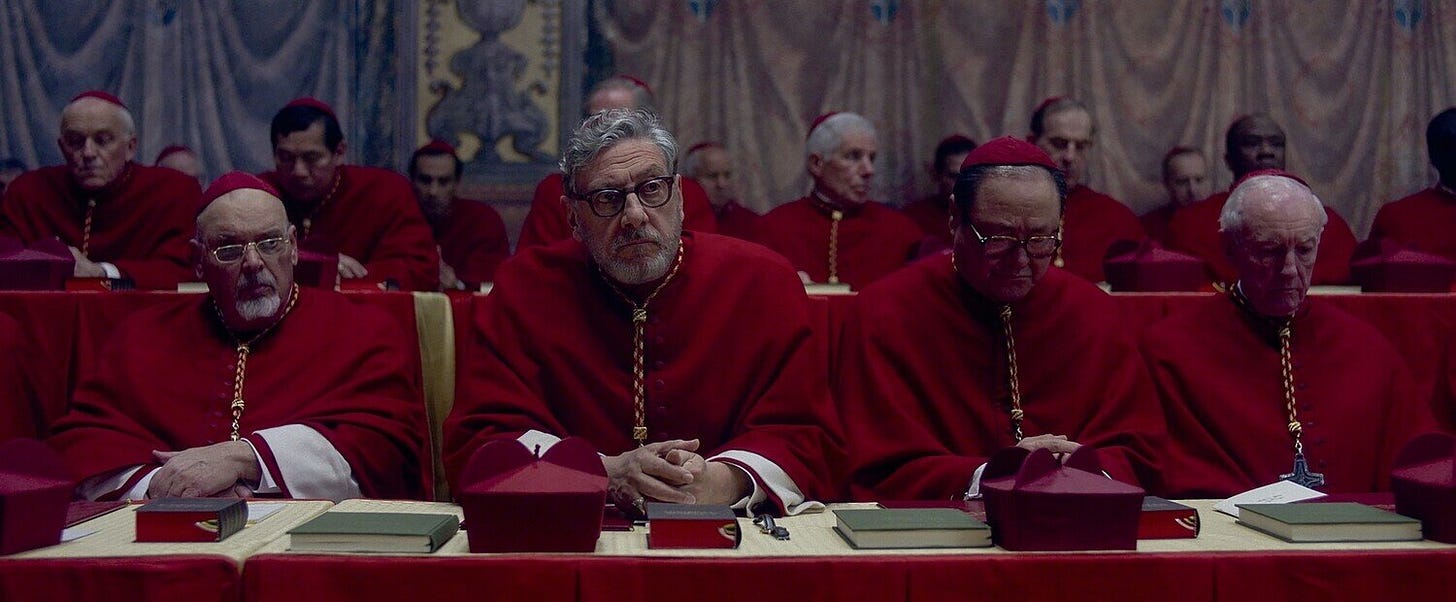Conclave (2024)
7/10
One of the cardinals tasked with electing a new pope in Conclave, directed by Edward Berger and based on the novel by Robert Harris, says he feels like he’s at an American political convention. Indeed, it’s no accident that the scheming for power, making and breaking of alliances, and culture wars between liberals and conservatives who ultimately represent the same institution bear a similarity to bourgeois democratic politics. Mauro Vanetti said the Roman Catholic Church is organized “like a cross between an old feudal monarchy and a modern political party.” But the outlook of Berger’s film is a distinctly liberal one.
Cardinal-Dean Thomas Lawrence (Ralph Fiennes) leads the College of Cardinals in choosing a successor to the recently expired pope. A liberal among the church leadership, Lawrence supports fellow liberal Aldo Cardinal Bellini (Stanley Tucci) for the papacy, fearing the victory of far-right traditionalist candidate Goffredo Cardinal Tedesco (Sergio Castelitto). When Bellini fails to garner the necessary votes in early rounds, they support moderate Joseph Cardinal Tremblay (John Lithgow) as their best hope of stopping Tedesco. Leading the papal enclave, secluded from the outside world, Lawrence navigates a minefield of potential scandals.
Conclave is often a beautiful film to look at, in part due to the grandiose setting it takes place in. Berger shot the film in Rome and the set designers have constructed a convincing replica of the Sistine Chapel, among other impressive architecture. There are some striking artistic shots, notably an overhead view of the cardinals walking through the rain carrying white umbrellas.
The story itself is compelling, starting with the result of the papal enclave itself, which has the inherent fascination of any competition in which a winner must prevail. Unsurprisingly with such a strong cast, the actors draw us further into the story with stellar performances. Tucci gets the best moments when the more hard-headed Bellini erupts at Lawrence. “I thought we were here to serve God, not the Curia,” Lawrence says, prompting Bellini to shoot back, “Oh, don’t be naive!” Still, Fiennes’ performance is the backbone of the film.
Over the course of the story, Lawrence uncovers multiple scandals or secrets that shift the terrain of the race to become the next pope or threaten to create a firestorm were they to become publicly known. However, by the end it feels that the screenwriters have created one potential bombshell too many, threatening to undermine our suspension of disbelief. True, we live in crazy times and what happens here is not outside the realm of possibility. But as the plot twists and revelations in Conclave start to pile up, they come dangerously close to soap opera.
The film’s liberal viewpoint is most evident in its protagonists and antagonists, which are best explained by analogy to contemporary U.S. politics. Tedesco is the right-wing bogeyman: a Trump-like figure who says the West is at war with Islam, rails against moral and cultural relativism, and displays thinly veiled racism when he warns that if doesn’t win, the church might elect an African bishop. A Tedesco papacy, we hear, would turn back the clock 60 years and erase any progress made since Vatican II.
What do Tedesco’s liberal opponents stand for? Bellini talks vaguely about taking a more progressive stance towards women, LGBTQ+ people, and abortion, though it’s not entirely clear what that would mean in practice. In his speech opening the conclave, Lawrence identifies doubt as necessary for faith. “Our faith is a living thing precisely because it walks hand in hand with doubt,” Lawrence says. “If there was only certainty and no doubt, there would be no mystery, and therefore no need for faith. Let us pray that God will grant us a pope who doubts.” Unlike the liberals Bellini and Lawrence, the right-wing traditionalist Tedesco is certain about his views.
The capacity for doubt has been vital to some of history’s greatest thinkers, from ancient Greek philosophers to modern scientists. A quote attributed to Socrates famously declares, “I know that I know nothing.” But doubt can also lead to paralysis, inaction, weak leadership, and betrayal. In the realm of politics, these qualities are characteristic of liberalism and reformism, particularly as capitalism slides deeper into crisis. “A liberal is a man too broadminded to take his own side in a quarrel,” Robert Frost said.
Our current political landscape is marked by the collapse of the centre and growing polarization, both to the right and the left. These trends find reflection in other institutions, including the church. As we see with the victory of figures like Trump, and likely Poilievre in Canada, liberalism is incapable of fighting the hard right. If Bellini is the “progressive” option, it soon becomes clear he doesn’t have the votes to become pope, prompting him and Lawrence to shift their support to Tremblay. “Is this what we're reduced to?” Bellini complains. “To vote for the least worst option?” Yes, because so-called “lesser-evilism” is all Democrats have to offer voters when they tell them to shut up and vote for the establishment candidate.
The way Conclave presents an act of violence in the third act, whatever the intention of the writers, seems to lend credence to Tedesco’s view. (Spoilers follow.) During the sixth ballot, a suicide bombing takes place in Rome that kills bystanders in the Vatican and damages the Sistine Chapel itself. Conclave presents no context for this attack. It says nothing about the motivations of the attackers. We can assume they are Islamic terrorists, since Tedesco’s rant against Islam immediately follows. But the reality of Western imperialist wars that have killed at least 4.5 million people since 9/11 cannot be mentioned in a Hollywood film, so viewers are left with no explanation other than the one presented by Tedesco.
Young Vincent Cardinal Benitez (Carlos Diehz)—a Mexican archbishop who has worked in Afghanistan—says violence should not be met with violence; that the church should base itself on love, not politics; and look to the future rather than the past. We’ve heard similar platitudes before from sanctimonious liberal politicians who have themselves inflicted the most extreme violence on innocent people. Conclave imagines that you can change the system from within. To further appeal to liberal viewers, Conclave adds a splash of identity politics when a late plot development suggests the next pope may challenge traditional gender roles in the church.
The only way to stop the victory of reaction and create a truly egalitarian society, one that reflects the message of Jesus Christ, is by providing a revolutionary alternative. It’s difficult to do this when representing an institution that began as a movement of the poor and oppressed, but which became a bulwark of the establishment 1,700 years ago. Despite its ideological weakness, Conclave is still engaging as a look at maneuvering for power within the Roman Catholic Church.







